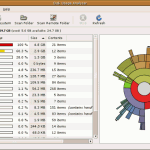In passato ho scritto un articolo sui comandi du e df che possono rispettivamente darvi informazioni riguardo l’utilizzo del disco e il disco libero del vostro computer Linux. Io personalmente uso entrambi questi comandi un sacco di volte mentre sono a lavoro per verificare file system e/o directory, ma capisco anche che su un desktop […]
Linux shell: capire umask con esempi
In un sistema GNU/Linux ogni file o cartella ha delle autorizzazioni di accesso. Ci sono tre tipi di autorizzazioni (cosa è permesso fare con un file di qualsiasi tipo, incluse le directory): (r) accesso in lettura (w) accesso in scrittura (e) accesso in esecuzione Ci sono anche altre autorizzazioni “speciali”, ma per questo articolo le autorizzazioni […]
Raspberry Pi qual è il segreto del suo successo e quali sono le sue potenzialità
Se in questi giorni date un’occhiata alla lista dei regali o possibili gadgets che saranno gettonati nel prossimo Natale troverete quasi sicuramente il Raspberry Pi . Questo è un computer delle dimensioni di una carta di credito che si collega al televisore e una tastiera. E’ un piccolo PC che può essere utilizzato per molte […]
Linux è meglio di Windows 8 per i giochi ?
Articolo di Jason Phillips Se sei un giocatore vero e proprio sai quanto possa essere terrificante Windows 8. Con i cambiamenti che hanno fatto ci potrebbe non essere alcun modo percorribile per i veri giocatori di ottenere il tipo di esperienza che vogliono. Aspettati seri inconvenienti dovuti alle implementazioni del DRM e maggiori difficoltà per […]
(English) Coloring Grep to easier research
Ci spiace, ma questo articolo è disponibile soltanto in Inglese Americano.


